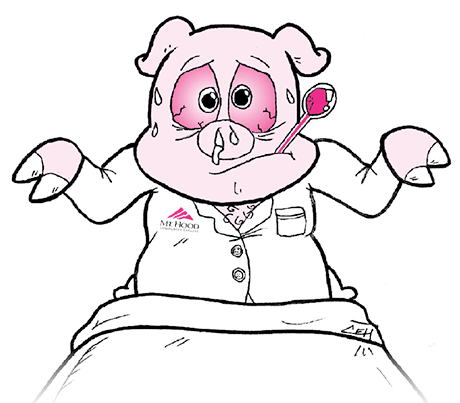
Illustration contributed by Christopher Hernandez
Confirmed cases of H1N1 hit MHCC campusHummingbirds give Kelley a career path
The Advocate
Several college officials said this week there have not been significant absences at MHCC due to swine flu but at least two student cases have been confirmed and other students are reporting flu-like symptoms.
MHCC Risk Manager Staci Huffaker said Wednesday there have not been “massive amounts of absentee students or faculty” at MHCC due to the H1N1 virus. But, she said, the college continues to prepare for a vaccination clinic on campus.
Huffaker said that vaccines for the H1N1 flu may arrive at MHCC around Nov. 14 and a clinic would be held that day. Huffaker stressed that this date is very tentative and this will only happen if vaccines are available.
Hardest hit in this flu season appears to be the women’s volleyball team. Head coach Chelsie Freeman said she got a text message Monday morning from freshman Kelsey Kai confirming that Kai had the H1N1 flu.
Around noon that same day, Kai posted a comment on her Facebook page that read “Swine flu. Just fantastic.”
Kai said she started developing symptoms on Friday. “I woke up that morning with a really bad cough,” she said.
Kai went with the team to the Pierce Crossover Tournament in Longview, Wash., last weekend and shared a room with Freeman and two other players.
Freeman said, “I feel fine.” Freeman did say she is taking extra precautions, such as eating healthy, sleeping, drinking lots of fluids, blowing her nose and gargling saltwater.
A Wednesday night match against Linn-Benton had to be rescheduled because, according to Freeman, 10 out of 12 players were showing symptoms of the flu, as well as assistant coach Stephanie Alleman.
Volleyball players are not the only ones struggling with health issues.
Sophomore Alia Apollo was diagnosed with the H1N1 flu last Friday.
Apollo left school early on Wednesday and said, “I’ve never slept so much in my life.” She said one of the scariest things about having the swine flu was having the chills and a 100-degree fever at the same time.
According to the Health and Wellness Resource Center portion of the MHCC website, the symptoms of H1N1 are similar to the symptoms of regular flu and include fever, cough, sore throat, body aches, headaches, chills and fatigue.
Like other influenza illnesses, H1N1 flu spreads from person to person through coughing or sneezing from people who are sick. Despite the flu’s nickname, one cannot contract H1N1 from eating pork or pork products.
According to Huffaker, people with flu symptoms are not being tested for the H1N1 flu and that only people who are hospitalized with symptoms will be tested.
The Multnomah County Health Department website said that vaccines are now being distributed to the following priority groups: pregnant women, children, young adults and people at high risk of medical complications from influenza and health care workers and emergency medical service workers.
“There are priorities, but I don’t determine that,” said Huffaker.
A list of community vaccination sites is available on the Health and Wellness Resource Center portion of the MHCC website. To get to that information, go to www.mhcc.edu and click on the student services link in the upper right hand corner. A drop-down menu will appear on the left side that will include the Health and Wellness Resource Center.
An Associated Press story Wednesday said, “The federal government originally promised 120 million doses of swine flu vaccine by now. Only 13 million have come through.”
The vaccines coming to MHCC will be available for all students, but Huffaker said they hope to get enough vaccines to help the staff and community as well.
Several instructors on campus have made arrangements for students who are affected by the flu.
David Todd, microcomputer application program instructor, said Thursday there have been one or two students out sick here and there, but it hasn’t wiped out any of his classes.
Economics instructor Ted Scheinman said it seems there are more students sick and absent than usual and that some students are staying home to take care of their sick children.
History instructor Pat Casey said he has not noticed a difference in comparison with last year.
The Center for Disease Control and Prevention issued a pamphlet that stated that if you do get H1N1, you should stay home and avoid contact with other people except to seek medical care.
The pamphlet also stated, “Most people have been able to recover at home from 2009 H1N1 without needing medical care and the same is true of seasonal flu.”
CDC recommends that a person with flu symptoms should stay home for at least 24 hours after the fever has gone. If there is a need to go out, CDC advises people to wear facemasks.
![]()
The Advocate reserves the right to not publish comments based on their appropriateness.
![]()
Notice: Undefined variable: c5t_output in /hermes/walnacweb06/walnacweb06ac/b2874/moo.advocateonlinenet1/mhccadvocate/102309/N_Swineflu.php on line 200
![]()
